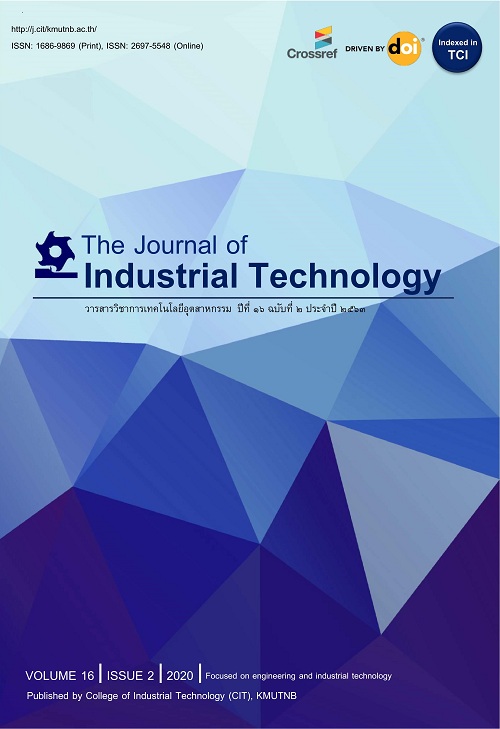The Quantitative and Qualitative Analysis of Logistics Performance Factors for Thailand’s Agriculture
การวิเคราะห์เชิงปริมาณและเชิงคุณภาพของปัจจัยด้านประสิทธิภาพโลจิสติกส์สำหรับภาคการเกษตรของประเทศไทย
Abstract
สถานการณ์ของโรคติดเชื้อไวรัสโคโรนาสายพันธุ์ใหม่ (โรคโควิด-19) ทำให้ส่งผลต่อพฤติกรรมลูกค้าโดยเฉพาะอย่างยิ่งในภาคการเกษตร ลูกค้าส่วนใหญ่ซื้อสินค้าผ่านช่องทางพาณิชย์อิเล็กทรอนิกส์ การเปลี่ยนแปลงของพฤติกรรมลูกค้าส่งผลต่อการปรับตัวทางธุรกิจ ดังนั้นการจัดการโลจิสติกส์ถือเป็นปัจจัยหลักในการตอบสนองความต้องการของลูกค้า งานวิจัยนี้มีวัตถุประสงค์เพื่อวิเคราะห์ปัจจัยด้านประสิทธิภาพโลจิสติกส์เพื่อยกระดับคุณภาพของการให้บริการด้านโลจิสติกส์ในภาคการเกษตรของประเทศไทย ซึ่งประกอบด้วย ด้านเวลาในการทำงาน ด้านการจัดการในระบบโลจิสติกส์ ด้านการอัพเดทสถานะของข้อมูลการขนส่ง และด้านการบริการลูกค้าสำหรับภาคการเกษตรของประเทศไทย งานวิจัยนี้เสนอการทบทวนวรรณกรรมเกี่ยวกับปัจจัยด้านประสิทธิภาพโลจิสติกส์และอุตสาหกรรม 4.0 ในระบบโลจิสติกส์ภาคการเกษตร และวิเคราะห์เชิงปริมาณและเชิงคุณภาพของปัจจัยด้านประสิทธิภาพโลจิสติกส์ในภาคการเกษตรประเทศไทย การจัดเก็บข้อมูลทำโดยใช้แบบสอบถามและการสัมภาษณ์เชิงลึก การวิเคราะห์ข้อมูลดำเนินการโดยใช้สถิติเชิงพรรณนา สถิติไร้พารามิเตอร์ และการวิเคราะห์เชิงเนื้อหา จากการศึกษาพบว่าปัจจัยด้านประสิทธิภาพโลจิสติกส์ทุกปัจจัยมีความสำคัญเป็นอย่างมากในระบบโลจิสติกส์ภาคการเกษตรของประเทศไทยซึ่งผลการศึกษาเวลาในการทำงานได้ลดลงร้อยละ 56.45 มากไปกว่านั้นผลการศึกษายังช่วยให้องค์กรมีความเข้าใจในการประยุกต์ใช้เทคโนโลยีในระบบโลจิสติกส์เพื่อเพิ่มความสามารถในการแข่งขันทางธุรกิจในภาคการเกษตรและธุรกิจอื่นๆ
The Coronavirus 2019 situation (COVID-19) has affected customer behavior, especially in agriculture. Most customers buy products via an e-commerce platform. The change in customer behavior results in business adaptation. Thus, the logistics system is the main key to meeting customer needs. This research aims to analyze logistics performance factors in order to enhance the quality of logistics service in Thailand’s agriculture that consists of working time, information management in the logistics system, provision of ongoing shipment status, and customer service for Thailand’s agriculture. The research presents the literature review of logistics performance factors and Industry 4.0 in the agricultural logistics system and the quantitative and qualitative analysis of logistics performance factors in Thailand’s agriculture. The data collection was carried out using questionnaires and in-depth interviews. The data analysis was conducted using descriptive statistics, nonparametric statistics and content analysis. Results from the study show that all logistics performance factors are very important in the agricultural logistics system as the result, there was processing time decreased by 56.45%. Moreover, the finding assists the organizations in order to gain a better understanding of technology implementation in logistics systems for enhancing business competitiveness in Thailand’s agriculture and other businesses.
Keywords
[1] L. Tan and C. Ma, Choice behavior of commuters rail transit mode during the COVID-19 pandemic based on logistic model, The Journal of Traffic and Transportation Engineering, 2021, 8(2), 186-195.
[2] Y. Buranasing, M. Jongprasithporn and N. Yodpijit, Applications of Industry 4.0 during COVID-19 Situation for Logistics System in Customer Satisfaction Context, 2021 IEEE International Conference on Industrial Engineering and Engineering Management (IEEM), Proceeding, 2021, 588-592.
[3] X.T.R. Kong, R.Y. Zhong, Z. Zhao, S. Shao, M. Li, P. Lin, Y. Chen, W. Wu, L. Shen, Y. Yu and G.Q. Huang, Cyber physical ecommerce logistics system: An implementation case in Hong Kong, Computers and Industrial Engineering, 2020, 139, 106170.
[4] E. Hofmann and M. Rusch, Industry 4.0 and the current status as well as future prospects on logistics, Computers in industry, 2017, 89, 23-34.
[5] H.M. Huizenga, J. Zadelaar and B.R.J. Jansen, Quantitative or qualitative development in decision making, The Journal of Experimental Child Psychology, 2021, 210, 105198.
[6] D. Tontoh, S. Jongprasithporn and N. Yodpijit, The design of digital information systems for inspection body (IB) of industrial product, The Journal of King Mongkut’s University of Technology North Bangkok, 2020, 32(4), 1-10. (in Thai)
[7] B. Texsanguan, T. Boonyasopon, W. Ketsingha and N. Surapongrakjaron, The development model of learning organization and knowledge management by knowledge sharing via internet network, The Journal of King Mongkut’s University of Technology North Bangkok, 2014, 24(1), 198-211. (in Thai)
[8] H. Yüksel, An empirical evaluation of industry 4.0 applications of companies in Turkey: The case of a developing country, Technology in Society, 2020, 63, 101364.
[9] T.P. Vu, D.B. Grant and D.A. Menachof, Exploring logistics service quality in Hai Phong, The Asian Journal of Shipping and Logistics, 2020, 36(2), 54-64.
[10] R. Beysenbaev and Y. Dus, Proposals for improving the logistics performance index, The Asian Journal of Shipping and Logistics, 2020, 36(1), 34-42.
[11] J. Muangprathub, N. Boonnam, S. Kajornkasirat, N. Lekbangpong, A. Wanichsombat and P. Nillaor, IoT and agriculture data analysis for smart farm, Computers and electronics in agriculture, 2019, 156, 467-474.
[12] V.L. Dang and G.T. Yeo, Weighing the key factors to improve Vietnam's logistics system, The Asian Journal of shipping and logistics, 2018, 34(4), 308-316.
[13] D.N. Le, H.T. Nguyen and P.H. Truongle, Port logistics service quality and customer satisfaction: Empirical evidence from Vietnam, The Asian Journal of Shipping and Logistics, 2020, 36(2), 89-103.
[14] B.S. Sergi and V.D. Aleo, S. Konecka, K. Szopik-Depczyńska, I. Dembińska and G.Ioppolo, Competitiveness and the Logistics Performance Index: The ANOVA method application for Africa, Asia, and the EU regions, Sustainable Cities and Society, 2021, 69, 102845.
[15] S.W. Jang and W.C. Ahn, Financial analysis effect on management performance in the Korean logistics industry, The Asian Journal of Shipping and Logistics, 2021, 37(3), 245-252.
[16] G. Büchi, M. Cugno and R. Castagnoli, Smart factory performance and Industry 4.0, Technological Forecasting and Social Change, 2020, 150, 119790.
[17] K. Nowicka, Smart city logistics on cloud computing model, Procedia-Social and Behavioral Sciences, 2014, 151, 266-281.
[18] X.T.R. Kong, J. Fang, H. Luo and G.Q. Huang, Cloud-enabled real-time platform for adaptive planning and control in auction logistics center, Computers and Industrial Engineering, 2015, 84, 79-90.
[19] L. Tarjan, I. Šenk, S. Tegeltija, S. Stankovski and G. Ostojic, A readability analysis for QR code application in a traceability system, Computers and Electronics in Agriculture, 2014, 109, 1-11.
[20] A. Kengpol and K. Perngkarm, Development of a database management system for reducing time to prepare documents of procurement spare parts and maintenance: A case study in a logistic industry, The Journal of King Mongkut’s University of Technology North Bangkok, 2019, 29(3), 421-430. (in Thai)
[21] O. Kunze, G. Wulfhorst and S. Minner, Applying systems thinking to city logistics: A qualitative (and quantitative) approach to model interdependencies of decisions by various stakeholders and their impact on city logistics, Transportation Research Procedia, 2016, 12, 692-706.
DOI: 10.14416/j.ind.tech.2022.04.003
Refbacks
- There are currently no refbacks.






